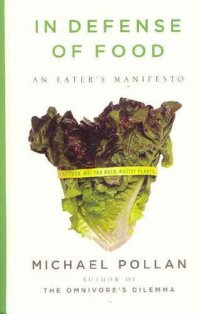
Ebook: In Defense of Food: An Eater's Manifesto
Author: Pollan Michael
- Tags: Nutritional Physiological Phenomena, Nutrition, Food habits, Compact discs, Audiobooks, Nutritional Physiological Phenomena -- Popular Works
- Year: 2008
- Publisher: Thorndike Press
- Language: English
- mobi
Amazon.com Review
Amazon Significant Seven, January 2008: Food is the one thing that Americans hate to love and, as it turns out, love to hate. What we want to eat has been ousted by the notion of what we should eat, and it's at this nexus of hunger and hang-up that Michael Pollan poses his most salient question: where is the food in our food? What follows in In Defense of Food is a series of wonderfully clear and thoughtful answers that help us omnivores navigate the nutritional minefield that's come to typify our food culture. Many processed foods vie for a spot in our grocery baskets, claiming to lower cholesterol, weight, glucose levels, you name it. Yet Pollan shows that these convenient "healthy" alternatives to whole foods are appallingly inconvenient: our health has a nation has only deteriorated since we started exiling carbs, fats--even fruits--from our daily meals. His razor-sharp analysis of the American diet (as well as its architects and its detractors) offers an inspiring glimpse of what it would be like if we could (a la Humpty Dumpty) put our food back together again and reconsider what it means to eat well. In a season filled with rallying cries to lose weight and be healthy, Pollan's call to action"Eat food. Not too much. Mostly plants."--is a program I actually want to follow. --Anne Bartholomew
From Publishers Weekly
Starred Review. Pollan provides another shocking yet essential treatise on the industrialized Western diet and its detrimental effects on our bodies and culture. Here he lays siege to the food industry and scientists' attempts to reduce food and the cultural practices of eating into bite-size concepts known as nutrients, and contemplates the follies of doing so. As an increasing number of Americans are overfed and undernourished, Pollan makes a strong argument for serious reconsideration of our eating habits and casts a suspicious eye on the food industry and its more pernicious and misleading practices. Listeners will undoubtedly find themselves reconsidering their own eating habits. Scott Brick, who narrated Pollan's The Omnivore's Dilemma, carries forward the same tone and consistency, thus creating a narrative continuity between the two books. Brick renders the text with an expert's skill, delivering well-timed pauses and accurate emphasis. He executes Pollan's asides and sarcasm with an uncanny ability that makes listening infinitely better than reading. So compelling is his tone, listeners may have trouble discerning whether Brick's conviction or talent drives his powerful performance.
Copyright Reed Business Information, a division of Reed Elsevier Inc. All rights reserved.